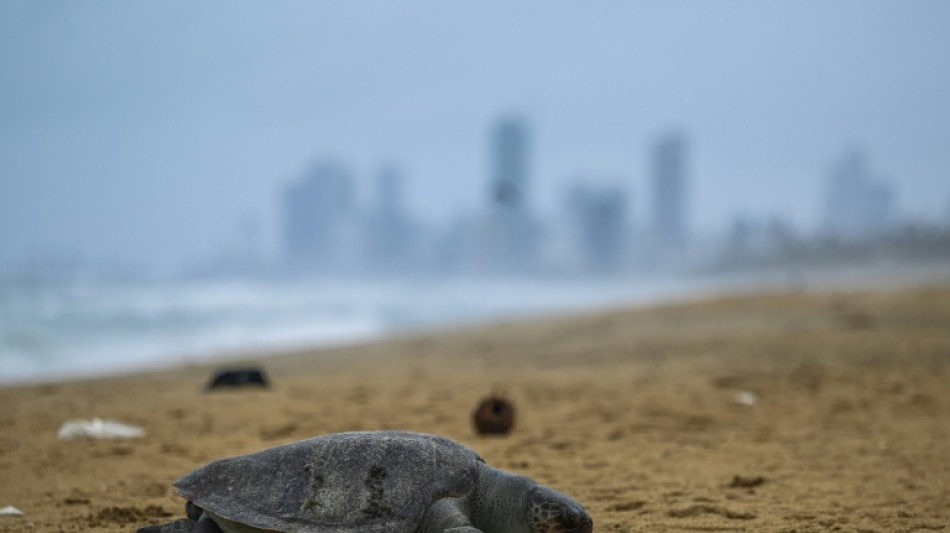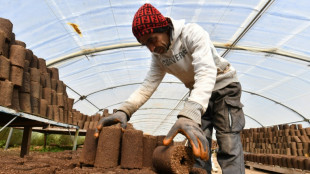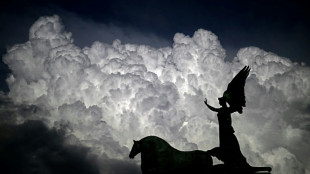
-
 Saka 'ready to go' after long injury lay-off: Arteta
Saka 'ready to go' after long injury lay-off: Arteta
-
Ingebrigtsen Sr, on trial for abusing Olympic champion, says he was 'overly protective'

-
 Tourists and locals enjoy 'ephemeral' Tokyo cherry blossoms
Tourists and locals enjoy 'ephemeral' Tokyo cherry blossoms
-
Khamenei warns of 'strong' response if Iran attacked

-
 France fines Apple 150 million euros over privacy feature
France fines Apple 150 million euros over privacy feature
-
UK PM urges nations to smash migrant smuggling gangs 'once and for all'

-
 Thai authorities probe collapse at quake-hit construction site
Thai authorities probe collapse at quake-hit construction site
-
France's Le Pen convicted in fake jobs trial

-
 Chinese tech giant Huawei says profits fell 28% last year
Chinese tech giant Huawei says profits fell 28% last year
-
Trump says confident of TikTok deal before deadline

-
 Myanmar declares week of mourning as hopes fade for quake survivors
Myanmar declares week of mourning as hopes fade for quake survivors
-
Japan's Nikkei leads hefty market losses, gold hits record

-
 Tears in Taiwan for relatives hit by Myanmar quake
Tears in Taiwan for relatives hit by Myanmar quake
-
Venezuela says US revoked transnational oil, gas company licenses

-
 'Devastated': Relatives await news from Bangkok building collapse
'Devastated': Relatives await news from Bangkok building collapse
-
Arsenal, Tottenham to play pre-season North London derby in Hong Kong

-
 Japan's Nikkei leads hefty equity market losses; gold hits record
Japan's Nikkei leads hefty equity market losses; gold hits record
-
Israel's Netanyahu picks new security chief, defying legal challenge

-
 Trump says US tariffs to hit 'all countries'
Trump says US tariffs to hit 'all countries'
-
Prayers and tears for Eid in quake-hit Mandalay

-
 After flops, movie industry targets fresh start at CinemaCon
After flops, movie industry targets fresh start at CinemaCon
-
Tsunoda targets podium finish in Japan after 'unreal' Red Bull move

-
 French chefs await new Michelin guide
French chefs await new Michelin guide
-
UK imposes travel permit on Europeans from Wednesday

-
 At his academy, Romanian legend Hagi shapes future champions
At his academy, Romanian legend Hagi shapes future champions
-
Referee's lunch break saved Miami winner Mensik from early exit

-
 Djokovic refuses to discuss eye ailment after shock Miami loss
Djokovic refuses to discuss eye ailment after shock Miami loss
-
Mitchell magic as Cavs bag 60th win, Pistons and T'Wolves brawl

-
 Mensik shocks Djokovic to win Miami Open
Mensik shocks Djokovic to win Miami Open
-
Duterte lawyer: 'compelling' grounds to throw case out

-
 What happens on Trump's 'Liberation Day' and beyond?
What happens on Trump's 'Liberation Day' and beyond?
-
Clock ticks on Trump's reciprocal tariffs as countries seek reprieve

-
 Japan-Australia flagship hydrogen project stumbles
Japan-Australia flagship hydrogen project stumbles
-
Musk deploys wealth in bid to swing Wisconsin court vote

-
 Mensik upsets Djokovic to win Miami Open
Mensik upsets Djokovic to win Miami Open
-
China manufacturing activity grows at highest rate in a year

-
 'Waited for death': Ex-detainees recount horrors of Sudan's RSF prisons
'Waited for death': Ex-detainees recount horrors of Sudan's RSF prisons
-
Japan's Nikkei leads big losses in Asian markets as gold hits record

-
 Rescue hopes fading three days after deadly Myanmar quake
Rescue hopes fading three days after deadly Myanmar quake
-
'Basketbrawl' as seven ejected in Pistons-Wolves clash

-
 Four men loom large in Microsoft history
Four men loom large in Microsoft history
-
Computer pioneer Microsoft turns 50 in the age of AI

-
 Trump calls out both Putin and Zelensky over ceasefire talks
Trump calls out both Putin and Zelensky over ceasefire talks
-
Kim Hyo-joo tops Vu in playoff to win LPGA Ford Championship

-
 Economy and especially Trump: Canadians' thoughts on campaigns
Economy and especially Trump: Canadians' thoughts on campaigns
-
Liberal PM Carney takes lead four weeks before Canada vote

-
 SpaceX to launch private astronauts on first crewed polar orbit
SpaceX to launch private astronauts on first crewed polar orbit
-
Australia open door for Kerr's return as Matildas captain

-
 The Premier League's unlikely pretenders to Champions League riches
The Premier League's unlikely pretenders to Champions League riches
-
IFabric Corp Reports Record Q4 and Full Year 2024 Revenues and Strong Profitability


Over 21% of reptile species at risk of extinction
At least one in five reptile species are threatened with extinction, including more than half of turtles and crocodiles, according to the first major global assessment of the world's so-called cold-blooded creatures.
Catastrophic declines in biodiversity across the world are increasingly seen as a threat to life on Earth -- and as important as the interrelated menace of climate change.
Threats to other creatures have been well documented. More than 40 percent of amphibians, 25 percent of mammals and 13 percent of birds could face extinction.
But until now, researchers did not have a comprehensive picture of the proportion of reptiles at risk.
In a new global assessment, published in the journal Nature, researchers assessed 10,196 reptile species and evaluated them using criteria from the International Union for Conservation of Nature (IUCN) Red List of threatened species.
They found that at least 1,829 -- 21 percent -- were either vulnerable, endangered or critically endangered.
"It's just overwhelming the number of species that we see as being threatened," said co-author Neil Cox, who manages of the IUCN-Conservation International Biodiversity Assessment Unit and co-led the study.
"Now we know the threats facing each reptile species, the global community can take the next step by joining conservation plans with global policy agreement and invest in turning around the often too under-appreciated and severe biodiversity crisis."
Crocodiles and turtles were found to be among the most at-risk species, with around 58 percent and 50 percent found to be under threat respectively.
Cox said this was often down to "over-exploitation and persecution".
Crocodiles are killed for their meat and to remove them from human settlements, he said, while turtles are targeted by the pet trade and used for traditional medicine.
- 'Furry, feathery' focus -
Another well-known species at risk is the fearsome king cobra, the world's largest venomous snake. It can grow to around five metres long, feasting on other snakes in forests across a huge area from India to Southeast Asia.
It has been classified as vulnerable, indicating it is "very close to extinction", Cox said at a press briefing on the research.
"It's a real iconic species in Asia and it's such a shame that even widespread species such as this are really suffering and in decline," he said, adding that logging and deliberate attacks by humans were among the biggest threats to the snake.
Bruce Young, chief Zoologist at NatureServe, who co-led the study, said threatened reptiles were largely found concentrated in Southeast Asia, Western Africa, northern Madagascar, the Northern Andes and the Caribbean.
The researchers found reptiles restricted to arid habitats such as deserts, grasslands, and savannas "are significantly less threatened" than those in forest habitats, he explained.
Agriculture, logging, invasive species and urban development were found to be among the threats to reptiles, while people also target them for the pet trade or kill them for food or out of fear.
Climate change was found to pose a direct threat to some 10 percent of reptile species, although researchers said that was likely an underestimate.
The researchers were surprised to find that conservation aimed at other creatures had also benefited reptiles to an extent, although they stressed that the study highlights the need for specific urgent conservation for some reptiles.
Young said the reptile assessment, which involved hundreds of scientists from across the world, took around 15 years to complete and was hampered by a lack of funding.
"Reptiles, to many people, are not charismatic. And there's just been a lot more focus on some of the more furry or feathery species of vertebrates for conservation," he said.
Researchers said they hope the new assessment will help spur international action to halt biodiversity loss.
G.Stevens--AMWN

